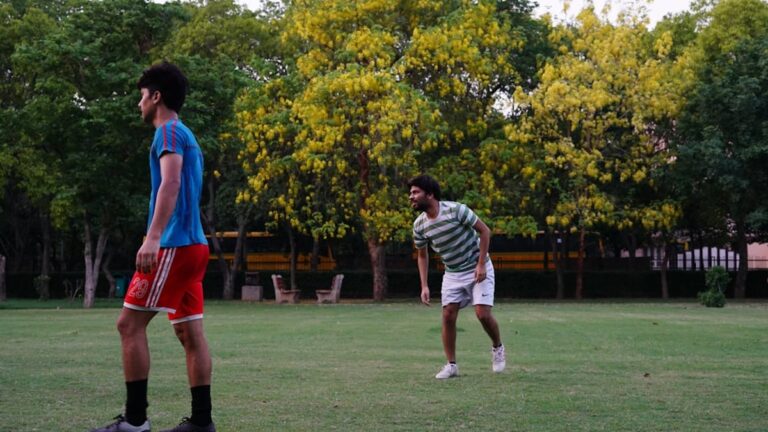Unleashing Your Inner Athlete: The Power of Mindset in Sports Performance
Have you ever watched an athlete perform flawlessly, seemingly in a different realm, while you struggle to lace up your sneakers for a jog? The truth is, we often overlook the most crucial aspect of sports performance—the mindset. Whether you’re a weekend warrior or an aspiring Olympian, the mental game can make or break your performance. It’s not merely about physical prowess; it’s about unleashing your inner athlete. Let’s dive into the profound influence of mindset on sports performance, and trust me, it’s a journey worth taking.
The Mind-Body Connection
Athletes often talk about being “in the zone,” a state where everything clicks, and performance feels effortless. This phenomenon isn’t just a poetic turn of phrase; it’s a very real psychological state rooted in the mind-body connection. Research suggests that our mental state can significantly affect physical performance. You might wonder, how does that work? Well, it’s all about focus, confidence, and emotional regulation.
Consider the case of Michael Jordan—arguably one of the greatest basketball players of all time. He didn’t just rely on his physical abilities; his mindset was a game-changer. Jordan once famously said, “I’ve missed more than 9,000 shots in my career. I’ve lost almost 300 games. Twenty-six times, I’ve been trusted to take the game-winning shot and missed. I’ve failed over and over and over again in my life. And that’s why I’ve succeeded.” This quote encapsulates the essence of resilience and the power of a positive mindset. Instead of being daunted by failure, he viewed it as a stepping stone to success.
Building a Winning Mindset
So, how do you cultivate a winning mindset? First, it’s essential to understand that mindset is not a fixed trait; it’s something you can develop. Here are several strategies that can help you unlock your potential:
- Set Clear Goals: Having specific, measurable, and achievable goals can provide direction and motivation. Instead of saying, “I want to run faster,” try “I want to run a 5K in under 30 minutes within three months.”
- Visualize Success: Visualization is a powerful tool. Picture yourself achieving your goals. Imagine the feelings associated with success—the rush of adrenaline, the joy of crossing the finish line, or the satisfaction of hitting that perfect shot.
- Practice Positive Self-Talk: The language you use with yourself matters. Replace negative thoughts with positive affirmations. Instead of saying, “I can’t do this,” switch to “I am capable of achieving my goals.”
- Embrace Challenges: View obstacles as opportunities for growth. When faced with adversity, remind yourself that overcoming challenges is part of the journey.
When I was training for my first marathon, I remember feeling overwhelmed with self-doubt. It was a chilly morning, and the thought of running 26.2 miles seemed daunting. But I learned to break it down into manageable pieces—each mile was a mini-goal, and before I knew it, I was crossing that finish line. It’s incredible what a shift in mindset can achieve!
The Role of Mindfulness in Sports
Mindfulness, the practice of being present and fully engaged in the moment, plays a significant role in enhancing athletic performance. It helps athletes manage stress, maintain focus, and foster resilience. Studies indicate that mindfulness can lead to improved concentration, better emotional regulation, and reduced anxiety—all crucial for peak performance.
Take a moment to think about a time when you were utterly absorbed in an activity—maybe it was a game of tennis, a cycling race, or even a spirited game of pick-up basketball. That focus, where everything else fades away, is the essence of mindfulness. It’s about tuning in to your body, the environment, and your thoughts without judgment.
Some athletes incorporate mindfulness techniques into their training regimens. For instance, NBA players like Kobe Bryant and LeBron James often utilized meditation and breathing exercises to enhance their focus and performance. In high-pressure situations, having a clear mind can be the difference between winning and losing.
Resilience: The Secret Sauce
Life in sports is a rollercoaster ride of highs and lows. Resilience—the ability to bounce back from setbacks—is a crucial component of a strong athletic mindset. Every athlete faces challenges, be it injuries, losses, or intense competition. What separates the greats from the good is how they respond to these adversities.
Take Serena Williams. Her journey has been fraught with challenges, from injuries to personal struggles, but her resilience has propelled her to the top of the tennis world. Williams has been quoted saying, “I am lucky that I am able to take my pain and use it as a tool to make me stronger.” This mindset of viewing pain as a catalyst for growth is something every aspiring athlete should embrace.
The Science Behind Mindset
Now, let’s delve into the science of mindset. Psychologists have identified two primary types of mindsets: a growth mindset and a fixed mindset. Developed by psychologist Carol Dweck, this theory has transformed how we approach learning and achievement.
A growth mindset embraces challenges, persists through difficulties, and believes that abilities can be developed through dedication and hard work. On the other hand, a fixed mindset views talents as static and often shies away from challenges for fear of failure. In sports, having a growth mindset can lead to greater perseverance, improved performance, and ultimately, success.
Consider a study conducted with collegiate athletes. The results indicated that those with a growth mindset not only performed better but also reported higher levels of enjoyment in their sport. It’s a reminder that enjoying the journey is just as important as the destination.
Creating a Supportive Environment
The power of mindset extends beyond the individual athlete; it’s also influenced by the environment in which one trains and competes. A supportive team culture fosters a positive mindset. Coaches, teammates, and even family members play a crucial role in shaping an athlete’s mental outlook.
Think about it—who hasn’t heard an inspiring locker room speech that sends shivers down your spine? A coach who believes in their players can instill confidence and resilience. I remember watching my high school soccer coach rally us before a big game, emphasizing the importance of teamwork and perseverance. Those words echoed in my mind long after the final whistle blew.
Mindset Interventions: The Psychological Edge
In recent years, sports psychologists have developed various mindset interventions to help athletes enhance their performance. These strategies often focus on cognitive behavioral techniques, visualization, and goal-setting to adjust how an athlete thinks about their capabilities and challenges.
One well-known approach is the “three Ps” technique: Personalization, Pervasiveness, and Permanence. This method encourages athletes to reframe negative thoughts by recognizing that failures are not personal (personalization), don’t define their entire performance (pervasiveness), and are not permanent (permanence). This simple yet effective technique can be a game-changer.
Mindset and Aging Athletes
Interestingly, the impact of mindset is not confined to the young and sprightly. Older athletes can also benefit significantly from cultivating a positive mindset. As we age, physical abilities may decline, but a strong mental outlook can help keep athletes competitive and engaged in their sport.
Take the case of 73-year-old tennis player and fitness enthusiast, John McEnroe. Despite his age, McEnroe continues to compete and thrive in his sport, largely due to his unwavering belief in his abilities and the importance of enjoyment over winning. His story serves as a reminder that it’s never too late to unleash your inner athlete.
Everyday Athletes and Mindset
Let’s not forget about the everyday athlete—the weekend jogger, the casual cyclist, or the yoga enthusiast. The principles of mindset apply universally, regardless of skill level. Whether you’re training for a marathon or simply trying to maintain a healthy lifestyle, your mindset can significantly influence your journey.
For instance, if you view exercise as a chore, you’re more likely to abandon it when motivation wanes. However, if you approach it with a growth mindset, seeing it as an opportunity to improve your health, boost your mood, and challenge yourself, you’ll be more inclined to stick with it.
One personal anecdote I can share is my own battle with running. I used to dread those early morning runs, but redefining my mindset—seeing it as “me-time” rather than a punishment—transformed my experience. Now, I look forward to lacing up my shoes and hitting the pavement.
The Road Ahead: Embracing the Mindset Journey
As we wrap up this exploration of mindset in sports, it’s essential to remember that this is an ongoing journey. Developing a strong mindset takes time, patience, and effort. There will be setbacks, moments of self-doubt, and times when you question your abilities. But every athlete, regardless of their level, has the power to shape their mindset.
In the words of the legendary coach John Wooden, “Things turn out best for the people who make the best of the way things turn out.” Embrace the power of your mindset, and you’ll find that the possibilities are limitless. Whether you’re sprinting down the track, diving into a pool, or simply trying to stay active, a positive mindset can lead to extraordinary results.
Conclusion: Your Inner Athlete Awaits
So, what are you waiting for? Your inner athlete is ready to be unleashed. Start by embracing the strategies we’ve discussed, cultivate a growth mindset, and surround yourself with positivity. Remember, sports are about more than just winning; they’re about personal growth, resilience, and the joy of movement.
As you embark on your athletic journey, keep in mind that the most significant victories often occur within. It’s time to step onto the field of your life and unleash the inner athlete that’s been waiting patiently for its moment to shine.
Now, go out there, lace up those shoes, and remember—every great athlete was once a beginner. You’ve got this!













